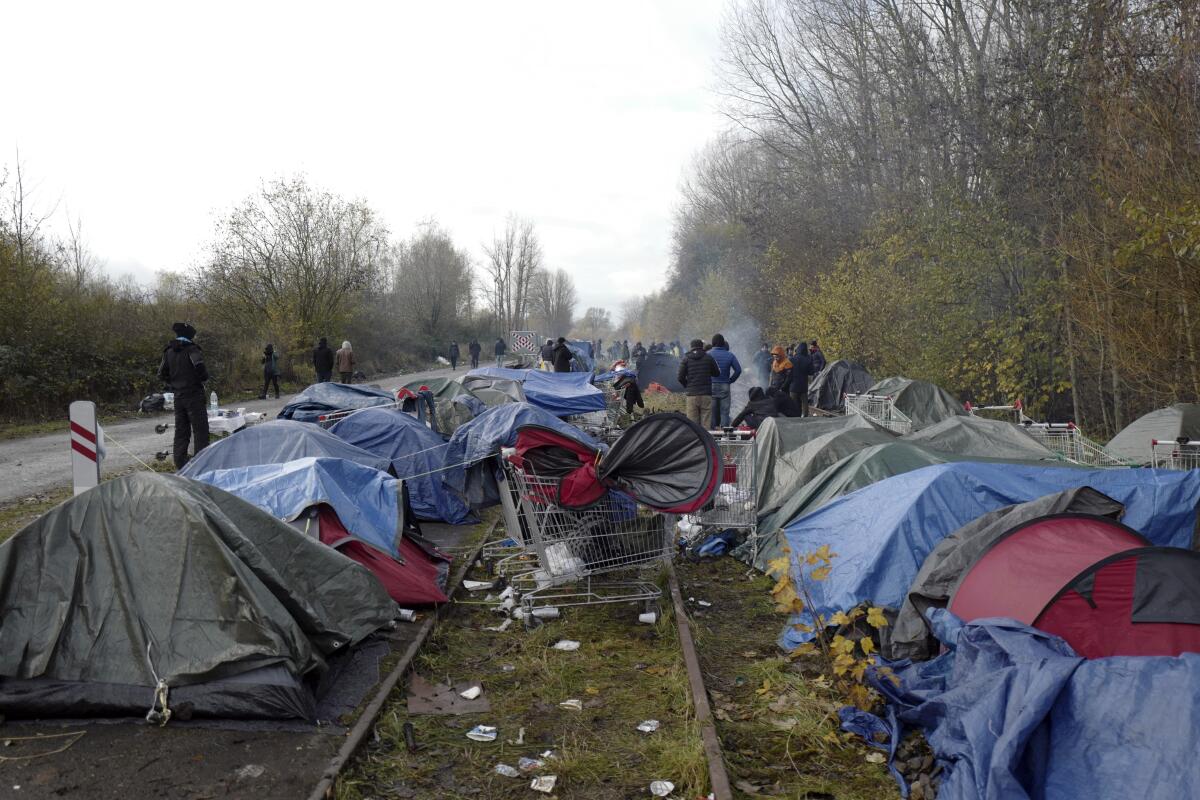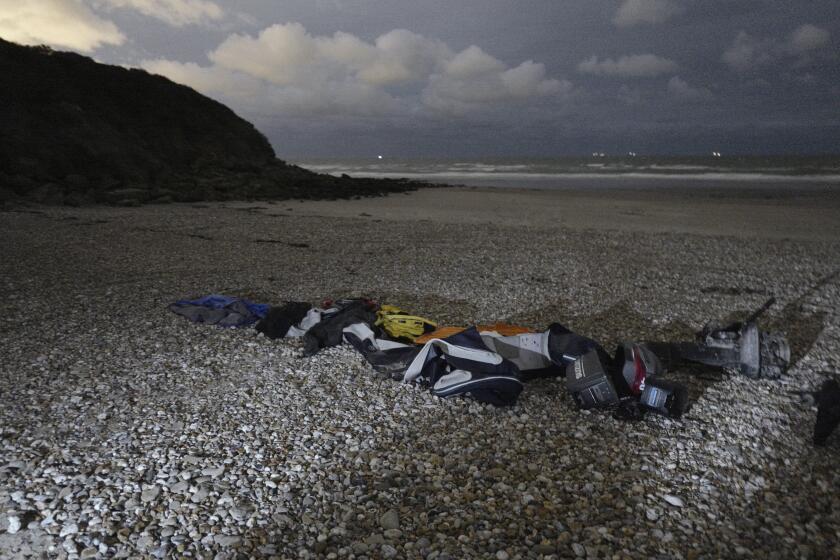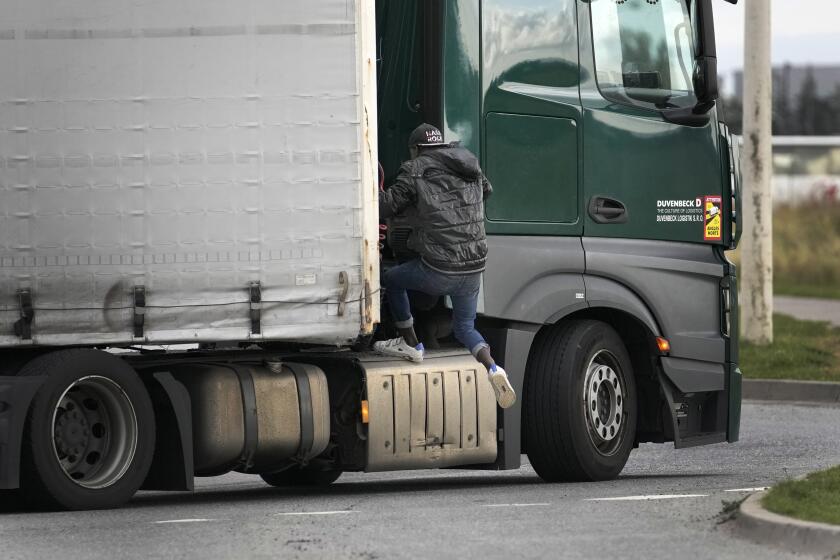Camped in France, migrants renew resolve to try for England

- Share via
CALAIS, France — At the makeshift camps in France near Calais and Dunkirk, migrants are digging in, waiting for their chance to make a dash across the English Channel despite the deaths of at least 27 people when their boat sank a few miles from the French coast.
Police have stepped up patrols in recent days and the weather has worsened, making this a bad time to attempt a crossing. But most migrants say the tragedy won’t prevent them from climbing into a flimsy inflatable boat packed with up to 50 people in hopes of reaching Britain.
“I don’t afraid of anything,” a 22-year-old from Iran who identified himself only as Kawa said in halting English. “Water? If we die … sorry to say this but we already died. Nobody accepts us anywhere. We’re useful. Useless, sorry,” he said, correcting himself. “Just look at these people.”
Kawa and his father spent the last six years in Denmark, where they say they never felt free because they constantly had to report to police and other authorities. Now they want to reach England, and eventually Canada, because “they are good to Iranians.”
They are among a group of about 150 young Kurdish men and a smattering of families camped Saturday on a disused railroad line in hopes of escaping the damp ground below. Alongside a collection of incongruously bright red, green and blue tents near Dunkirk, they pull hoods over their heads, hunch shoulders inside winter jackets and huddle next to small fires to stay warm as an early winter chill grips northern Europe. The smell of burning plastic hangs in the air as the migrants use anything they can find as fuel.
The deaths of at least 27 people in the English Channel are fueling tensions between the U.K. and France over how to stop migrants from crossing.
The coast around Calais has long been the jumping-off point for migrants anxious to get to the U.K. But this week’s disaster underscores the combination of dreams and despair that drives people to camp in drizzling rain with temperatures hovering around 40 degrees for the chance to risk their lives at sea.
But first they have to pay smugglers about $3,300 for a seat in a boat.
Ari, who like other migrants declined to give his last name for fear of being deported if he is caught, is a physics teacher from Iraq who left home because he couldn’t find work.
He says he is frightened about the crossing — but the chance for a better life is worth the risk.
“Everyone is scared. But everyone here — they die (a little) every day,” he said, giving a subtle nod to the camp littered with rotting banana peels, soggy shoes and tents abandoned by migrants who have already left for England.
Wednesday’s tragedy came amid a jump in the number of migrants trying to cross the channel in inflatables and other small craft after the COVID-19 pandemic limited air and ship travel and Britain’s departure from the European Union curtailed cooperation with neighboring countries in processing asylum-seekers and other migrants.
More than 23,000 people have already entered the U.K. on small boats this year, up from 8,500 last year and just 300 in 2018, according to data compiled by Parliament.
Despite this increase, the number of people applying for asylum in Britain is still relatively low compared with other European countries. Migrants heading for Britain usually do so because of family, historical or geopolitical reasons, said Nando Sigona, chair of International Migration and Forced Displacement at the University of Birmingham.
Young men who fled war in Sudan now spend their days in the French port of Calais, trying to jump onto moving trucks bound for Britain.
“So people in Calais are there because they want to come here,” he said.
Britain has criticized France for not doing enough to stop the boats before they are launched, but migrants say police have become more active since the deaths.
So they are simply waiting for things to calm down and the weather to improve.
Amanj, 20, a Kurdish activist from Iran, says he has no choice but to press on. His father was recently jailed and the family doesn’t know what happened to him. Amanj fears he could be next.
“Maybe I would die if I was in Iran, you know. Maybe I was … killed by police with a gun. Nobody knows,” he said. “If not today, maybe tomorrow you die anyway.”
Fifteen miles to the west at a camp outside Calais, migrants from Sudan kick a soccer ball around a patch of bare ground and hang laundry on a fence in hopes it will dry in the weak sunshine.
Patrick yearns to reach Liverpool and study political science. He says he has tried to smuggle himself onto a vehicle heading for Britain every day for the past six months. Now he’s ready to try the boats, if he can find the money.
“I dream of England,’’ he said “I know that some people died in the sea, but I will try by sea or by any other way.”
In Calais, aid groups have taken over a warehouse where they collect supplies like sleeping bags, food and firewood that they distribute to migrants at designated spots around the city.
Opie Cook, 27, is sorting vegetables for a vat of salad after taking a leave of absence from her job at HP to help the migrants.
“It’s sad that it has taken such a tragedy for this to be talked about again,” she said.
Back in the camps, men take off their shoes and nudge their feet as close to the campfires as possible, trying to dry them off and stay warm.
Amid the despair, there is also determination.
Ari, the teacher from Iraq, traveled first to Belarus before taking a train through Poland, then through Germany to reach the channel coast.
His destination is Bournemouth, where he has family. And he intends to make it.
“We want to get free,” he says. “That’s why we’re here.”
More to Read
Sign up for Essential California
The most important California stories and recommendations in your inbox every morning.
You may occasionally receive promotional content from the Los Angeles Times.











